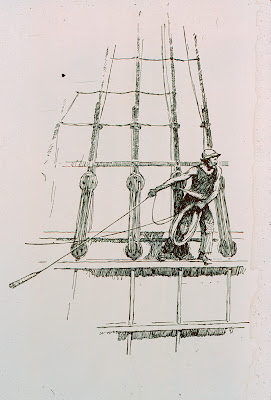Fathom

Fathom is a word that served a useful purpose at one time. It started out in Old English as a word to describe a person standing with two arms outstretched. The Dutch formalized it as a measurement of six feet, roughly the distance from fingertips to fingertips when your arms are stretched as wide as they can reach. (Ask any fisherman.)
For centuries, the fathom was the unit of measurement used by sailing ships to take soundings--in other words, to determine the depth of the water under the vessel to prevent grounding. Shakespeare used the word in that maritime sense in the Tempest: “Full fadom fiue thy Father lies.” [I. ii. 396] The spelling varied through the years, ranging from faethom to vadome to fadome to fawdome and so on.
The idea of measuring the depth of the water was later extended to intellectually delving into, seeing through, and thoroughly understanding someone or something. Fannie Burney used the word in this sense in her Diary: “His character I am at this moment unable to fathom.” It also showed up in Charlotte Bronte’s Villette: “I saw something in that lad's eye I never quite fathomed.” It’s still a useful verb, even showing up in sporting news headlines: “Dolphins' playoff drought hard to fathom: Dolphins face 5th year in a row with no postseason.” [South Florida Sun-Sentinal]
SIDEBAR: Fathom Archive


Comments